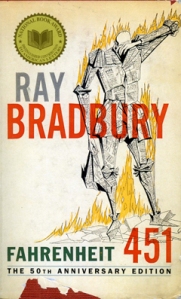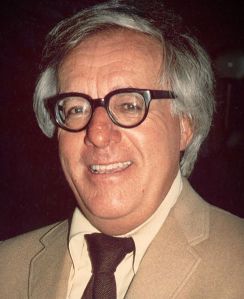This past week saw the passing of a titan, and with him one of the last vestiges of the golden age of science fiction. This passing went largely unnoticed with political news, celebrity gossip, and the latest Twitter and Facebook posts taking top spot. It is oddly ironic, as in his seminal work, Fahrenheit 451, he predicted such a society.
His name was Ray Bradbury, and he is considered, along with Jules Verne, HG Wells, Arthur C. Clarke and Isaac Asimov as one of the founders of the genre we have come to identify as science fiction. He was born in 1921 in Waukegan, Illinois. He grew to notoriety as a writer, having written over 300 short stories and several novels. He also wrote the screenplays for such notable films as The Beast from 30,000 Fathoms ( a collaboration with fellow visionary Ray Harryhausen), and John Huston’s adaptation of Moby Dick. He also served as an Idea Consultant for the 1963 New York World’s Fair ( the fair ground itself has been seen in such films as Men in Black, and doubled as the Stark Expo in Iron Man 2 and Captain America: The First Avenger.) He was also one of the designers of the ride at Epcot Center at Disney World, better known as “The Epcot Ball.” Moreover, he got to witness as many of the things he and fellow visionaries dreamt up in their stories came to pass.
I encountered his work sometime after college. At that point I was a young, aspiring writer, with plenty of drive and ambition but lacking focus. That was when my trusted friend and mentor, Dr. Thomas Becknell recommended Ray Bradbury to me, specifically his non-fiction book Zen in the Art of Writing. I loved the book so much that I had to read his fiction and well, and as such a friend of mine gave me a number of his books as Birthday and Christmas gifts.
Among them was Fahrenheit 451, a book that I loved so much that I know read it annually, along with the Bible, Dickens Christmas Carol, Tolkien’s Lord of the Rings, and CS Lewis’ The Chronicles of Narnia. As I read it I was struck by how prophetic his words were, and by his own admission that was never his intention. I could do an endless series of blog posts dedicated to that concept, but others far better then I have tackled that subject.
It is a powerful, but divisive little book. It is on the list of the most frequently banned and challenged books in schools. Even those who have read the book and love it, misinterpret the text. Some think it’s about censorship because of the book burnings that take place in the novel. However, those only happen as a final result of people no longer caring about books, reading, or even learning new things. His book is a clarion call to writers and readers to take a moment to pause, in that moment, to think and reflect. We even see as the book progresses that the protagonist, Guy Montag, starts out swearing quite often in the earlier chapters, but as the story goes on and as he grows and learns more things and reads more he becomes much more adept at expressing himself. He reminded us that knowledge changes people, hopefully for the better.
Many have seen this book as a treatise on censorship, but that is far from it.
As the character of Guy Montag says, “There must be something in those books, things we can’t imagine… you don’t stay for nothing…I thought about books, And for the first time I realized that a man was behind the books. A man had to take a long time to put them down on paper. And I’d never thought about that before. It took some man a lifetime maybe to put some of his thoughts down….”
It is a story abut the importance of books and words and thinking. But more then that, Fahrenheit 451 and many of his short stories deal with one important subject: the idea of a legacy. As one Professor Granger tells Guy Montag in Fahrenheit 451,
“Everyone must leave something behind when he dies, my grandfather said. A child or a book or a painting or a house or a wall well built or a pair of shoes made, or a garden planted. Something your hand touched some way so your soul has somewhere to go when you die, and when people see that tree or the flower that you planted you’re there.
Sure enough Ray Bradbury did just that. I had often wished to meet Ray Bradbury so I could shake his hand, get him to sign a copy of one of his books and thank him for his writings, but sadly that time has passed. However, in some larger way, I did meet him, through his books, and he reached across time and shook my hand .Then rather then write his name in a book, his writings left an indelible mark on my mind and imagination, and on countless others as well.
That is an awesome legacy, and that autograph on my imagination is something that can never fade. So thank you, Ray Bradbury. Thank you for taking the time you did to write your works. They have made an impact on my life and on the lives of others. It will never be forgotten.

